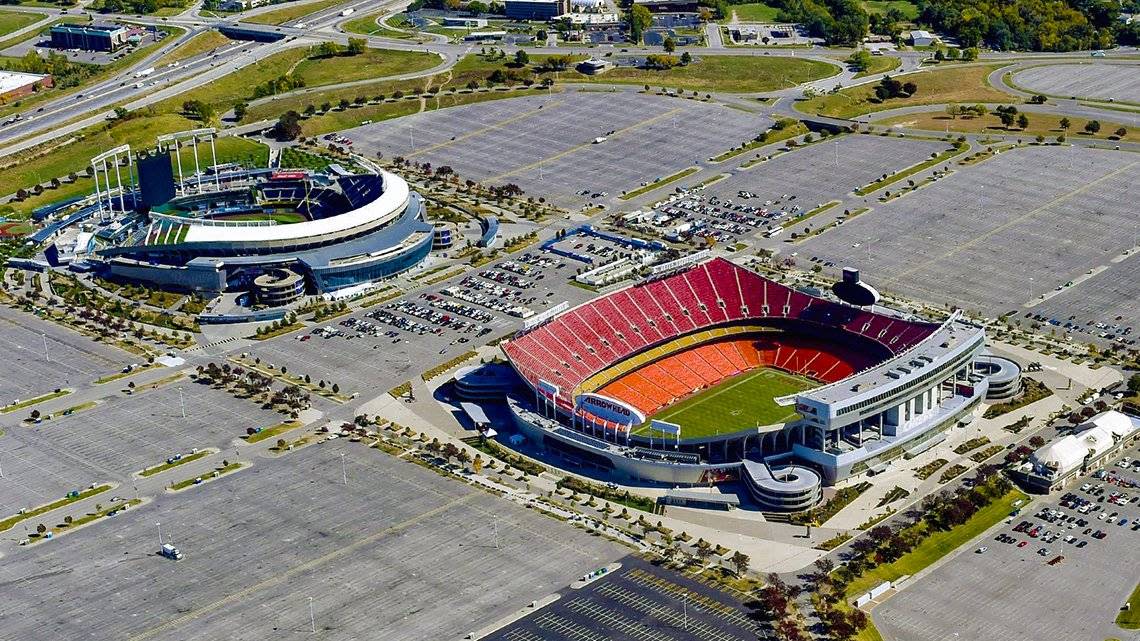Royals’ stadium got bad concrete and Arrowhead didn’t? Officials demand investigation

Reality Check is a Star series holding those in power to account and shining a light on their decisions. Have a suggestion for a future story? Email realitycheck@kcstar.com
If Kauffman Stadium suffers from “concrete cancer,” as the Royals have alleged, why doesn’t neighboring Arrowhead Stadium suffer from the same when the side-by-side stadiums were built at the same time at the Truman Sports Complex?
In a letter obtained by The Star through an open records request, Jackson County Executive Frank White Jr. and county legislature chair Jeanie Lauer have asked the chairman of the county sports complex authority to investigate the situation after Chiefs President Mark Donovan raised the issue at a news conference last week.
“One team got a good batch of concrete, and one team didn’t,” Donovan said.
Donovan made the claim when a reporter asked why the Chiefs would want to remain at Arrowhead for decades to come — at a cost of $800 million — when the Royals have cited deteriorating concrete at The K as one reason the team says staying there long term is not an option.
“There are some real issues with their concrete. We know that because we’ve seen both studies,” Donovan added.
County officials have not seen those studies; the Royals declined to release their study when The Star requested it last year.
So White and Lauer, who opposed putting the stadium sales tax issue on the April 2 ballot because many questions remained unanswered, now want the sports complex authority to look into the claim, writing that county voters deserve the information before casting their ballots.
“Given the gravity of these claims and the potential implications for public safety and financial stewardship, we formally request that the Jackson County Sports Complex Authority initiate an immediate and through investigation into the veracity of Mr. Donovan’s statements,” White and Lauer wrote in their letter Friday to Shawn Foster, chairman of the Jackson County Sports Complex Authority.
Regardless of the concrete’s condition, the Royals maintain that they have no intention of playing at Kauffman Stadium, their home since its opening in 1973, after their lease expires. They have not said what they will do to meet their timetable of playing in a new ballpark by 2028, if the sales tax issue fails at the polls.
But concrete cancer — the formal term is alkali-silica reaction — was a key issue the team raised more than a year ago in announcing the organization’s decision to pursue construction of a downtown ballpark. Fixing the problem and making the kinds of upgrades the team wants to remain competitive in Major League Baseball would cost as much or more than a new ballpark, the Royals said at the time.
The team is now focusing more on the other explanation for its decision. A downtown ballpark would provide opportunities for commercial development around the stadium that were not feasible at the sports complex, the team says.
But because the concrete cancer issue keeps coming up, White and Lauer say in their letter that the public needs to know whether Kauffman is in as bad shape as the team has said it is.
“Mr Donovan has publicly stated that Arrowhead Stadium does not suffer from ‘concrete cancer’... whereas Kauffman Stadium, constructed in the same period and ostensibly with the same materials, does due to a purportedly ‘bad batch’ of concrete.
“This assertion raises significant questions, particularly as the Jackson County Sports Complex Authority’s annual facility report had made no mention of ASR or similar structural concerns.”
The Royals say those annual reports differ in scope from the reports they had done that focus on the long-term viability of the stadium.
Donovan’s assertions came as both teams are asking county taxpayers to replace the current stadium sales tax — three-eighths of a cent, set to expire in 2031 — with a new three-eighths of a cent tax that would last for 40 years.
The tax revenue would go to help pay an as-yet undefined portion of the cost for a new Royals ballpark in the Crossroads Arts District near downtown, as well as more than half of the cost of renovating Arrowhead Stadium. The Chiefs say they will pay $300 million of that, plus cost overruns, but have not said how much of the remaining $500 million would come from Jackson County.
Kansas City and the state of Missouri are also likely sources of taxpayer support, but neither has made any public promises.
The sales tax would also go to pay each team to maintain and operate the stadiums, which they would lease from the county.
White and Lauer both opposed putting the measure on the April ballot until more details were worked on. As of Monday, neither team had signed a proposed lease or community benefits agreement.
Jim Rowland, executive director of the sports complex authority, told KCUR that those leases could be made public later this week.
White and Lauer noted that absentee voting has already started and that before people vote on Election Day they need to know whether one or both stadiums suffers from concrete cancer before agreeing to spend perhaps $2 billion in tax dollars for principal and interest and payments to the teams for the next 40 years.
“The outcome of this investigation could have significant implications for voter decision making,” they said. “It is our collective responsibility to ensure that voters are fully informed about the state of our community assets and the potential financial implication of the proposed tax.”
The sports complex authority did not immediately respond to requests for comment.

